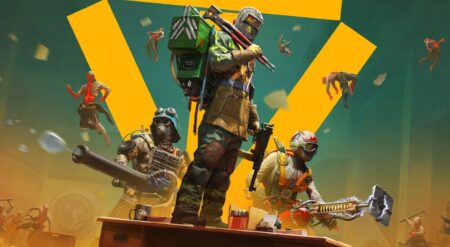
Blacksmith Legends is an RPG management sim developed by VM Gaming Limited and published by Rockgame S.A. The title sees players opening up their own blacksmith shop to make horseshoes and hammers in a small village before expanding to open shops in multiple cities and managing a team of adventurers.
The game is launching in early access, but still boasts a healthy amount of content. It all starts with building your very first shop with a basic but sufficient building system. It lets you put down different floors and walls, add windows, a variety of decorations, and of course, a door. It also lets you customize the work area for your workers, and its node-based system makes sure that it is a trouble-free process. However, it can be frustrating that the player is unable to rotate the camera to get a better look at their shop.
Once your shop is set up, it’s time to get to work with a basic blacksmith. At the start of the game, the player is led by a series of quests that help keep the game from being overwhelming, but the tutorial definitely overstays its welcome. Once that is out of the way, you’re free to really start going.
The gameplay loop of Blacksmith Legends has you purchasing raw materials to create items that are then sold at the market with their price depending on demand at the time as well as the item’s quality. Quality is determined by a variety of factors, such as the equipment in the shop and the blacksmith’s experience and morale. This introduces an interesting balance of keeping up with demand to maximize the day’s profits while not pushing the staff so hard that their quality begins to suffer.To help achieve this players can fund upgrades for their workers and consult high-level data, although some of it is still set to come in the future.
A particularly interesting foil to Blacksmith Legends, however, is the way that the player can impact the game’s world as well. The public roadmap released by the developers details ways that this aspect of the game is planned to be expanded in the future, including bandit raids and wars across the world map. However, the bones of the system are already present.
Every item that can be crafted is labeled as some combination of three categories. As the player sells more items of those categories the towns they sell in will eventually turn more towards those uses. So, if a blacksmith just keeps selling military weapons and nothing else, the town will lean towards the military rather than agriculture. While the system will surely be expanded on in the future, its current implementation is a solid start that does a lot to put the player’s efforts and decisions in a larger context and let them have an impact on their towns.

The player’s influence on the world is extended further by recruiting a team of adventurers to not only secure expensive resources for them but also to make a difference on the world, whether it be a positive or a negative one. Each adventurer hired can be set up with different equipment before being sent out to different locations on the world map. There, they will fight bandits, slay monsters, and collect treasures to return with.
Combat is handled in a turn-based fashion, but with very little player input. The moves of every character and enemy are automatically executed with the player instead clicking on quick flashes of defense and attack icons to help their heroes perform better. The system is barebones, and it seems as if it would be preferable to just have the combat handled without the player’s participation at all rather than locking them in for a simple mini-game.
However, combat also makes an appearance in the arena. There, players are able to sponsor a gladiator to fit out with their best gear and have a fight in their name. Combat in the arena is turn-based but is instead controlled by the player. There is a selection of basic attacks and a block action. The system is again simple but has enough interaction and strategy to keep it engaging.
Once a player’s shop has expanded enough they may also want to look into expanding their operations. Apart from blacksmithing, there are also full systems for both smelting and alchemy. All three roles are fleshed out and different in their own ways while having interactions between them that are required to make the very best products. Having so many options is a great way to bring diversity to the game, and makes reaching the later portions of the game much more rewarding.
There is still a lot that Blacksmith Legends is hoping to add in the future, and there is no way to tell how that content will shape up. However, what is being included in its early access launch is impressive, and gives a lot of confidence to those behind it. Even in early access, the game is worth checking out for fans of management sims, and it seems as though it will only get better going forward.
Blacksmith Legends is available in early access on Steam.






